A sign of things to come
Robert Triggs / Android Authority
Oppo’s Find N2 is the company’s second commercially available swipe at the foldable phone-tablet form factor. However, like the original Find N, it’s still only available in China (for the time being), and our admittedly brief time spent with the unit so far has been spent overcoming a few obstacles in the handset’s Chinese software. Still, there are plenty of interesting things to talk about with the Find N2 already.
Unlike Samsung’s Galaxy Z Fold 4, Oppo opts for a compact form factor. Closed, the handset measures just 132.2mm x 72.6mm, considerably shorter and only slighter wider than its main rival. It’s thinner and lighter too, dropping the weight by 42g down to 233g, and it’s 1.3mm slimmer when closed compared to the first Find N. The net result is a non-flip foldable that finally feels comfortable to carry in my pocket and use in one hand. You’ll have no trouble reaching the upper or lower portions of the front screen here.
Speaking of, the front screen is now a swanky 5.54-inch 120Hz AMOLED panel, although it’s still missing LTPO technology for ultra-low refresh rates. Despite its size, this screen is ample for sending texts, taking calls, and even browsing the web for short sessions.
Open it up and you’re greeted with a 7.1-inch, 120HZ LTPO AMOLED panel that’s built for reading and multitasking. It’s wider than Samsung’s implementation, making it better for watching video too, even though the internal panel is smaller overall. Unfortunately, the plastic coating on the screen is a bit of a fingerprint magnet. These foldable screens still don’t feel as premium as a traditional, glass-coated panel.
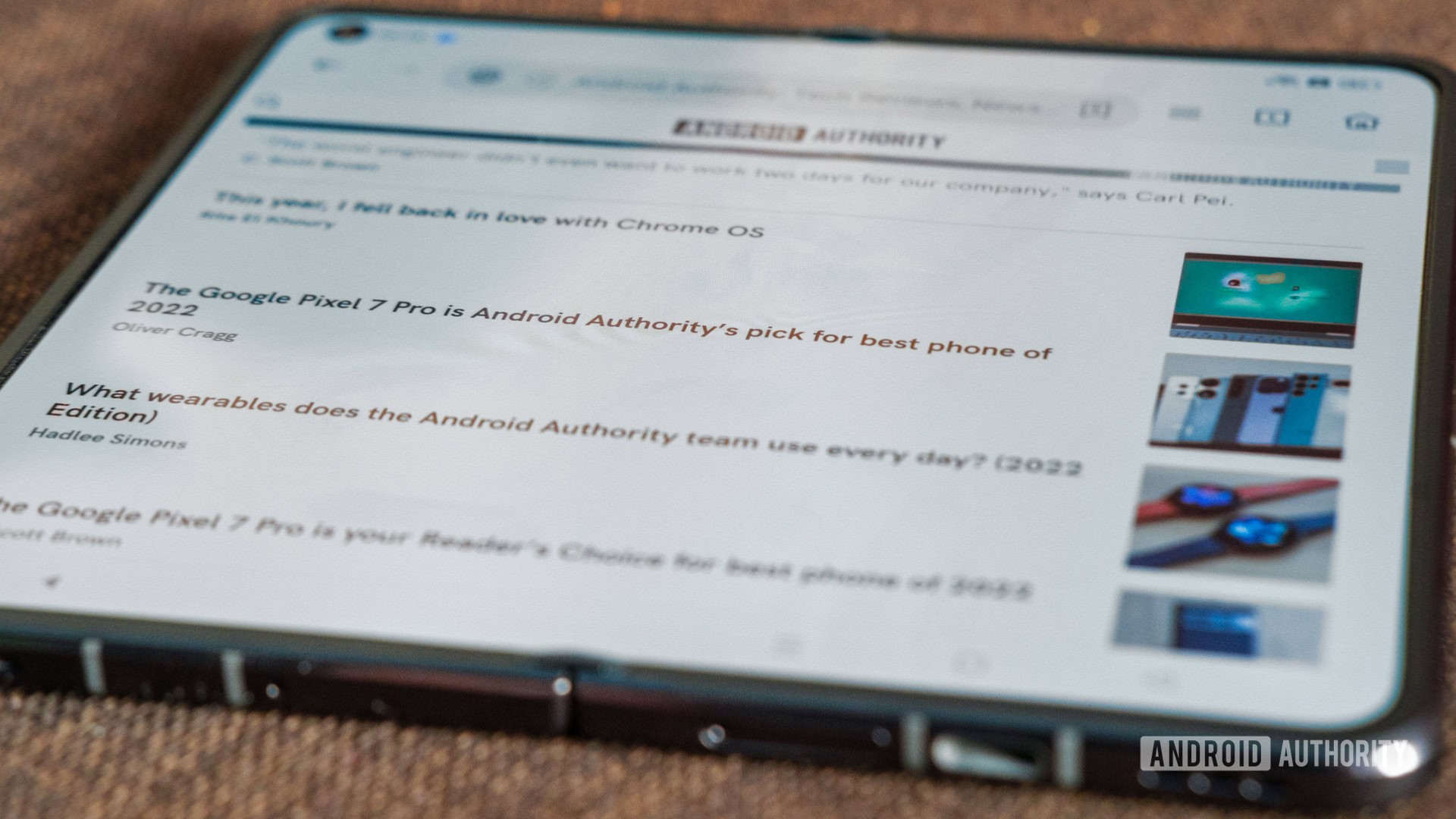
Robert Triggs / Android Authority
Oppo claims the Find N2’s all-important crease is now almost invisible from most angles. That’s certainly the case when looking at the screen face-on, which you’ll be doing most of the time. As you can see above, it looks very flat with no discernable lines.
However, you can spot the two creases down the center when viewing the display from a slight side angle, particularly with a bright white screen. Overall though, the crease is really not a problem. At least when the handset is fresh out of the box.
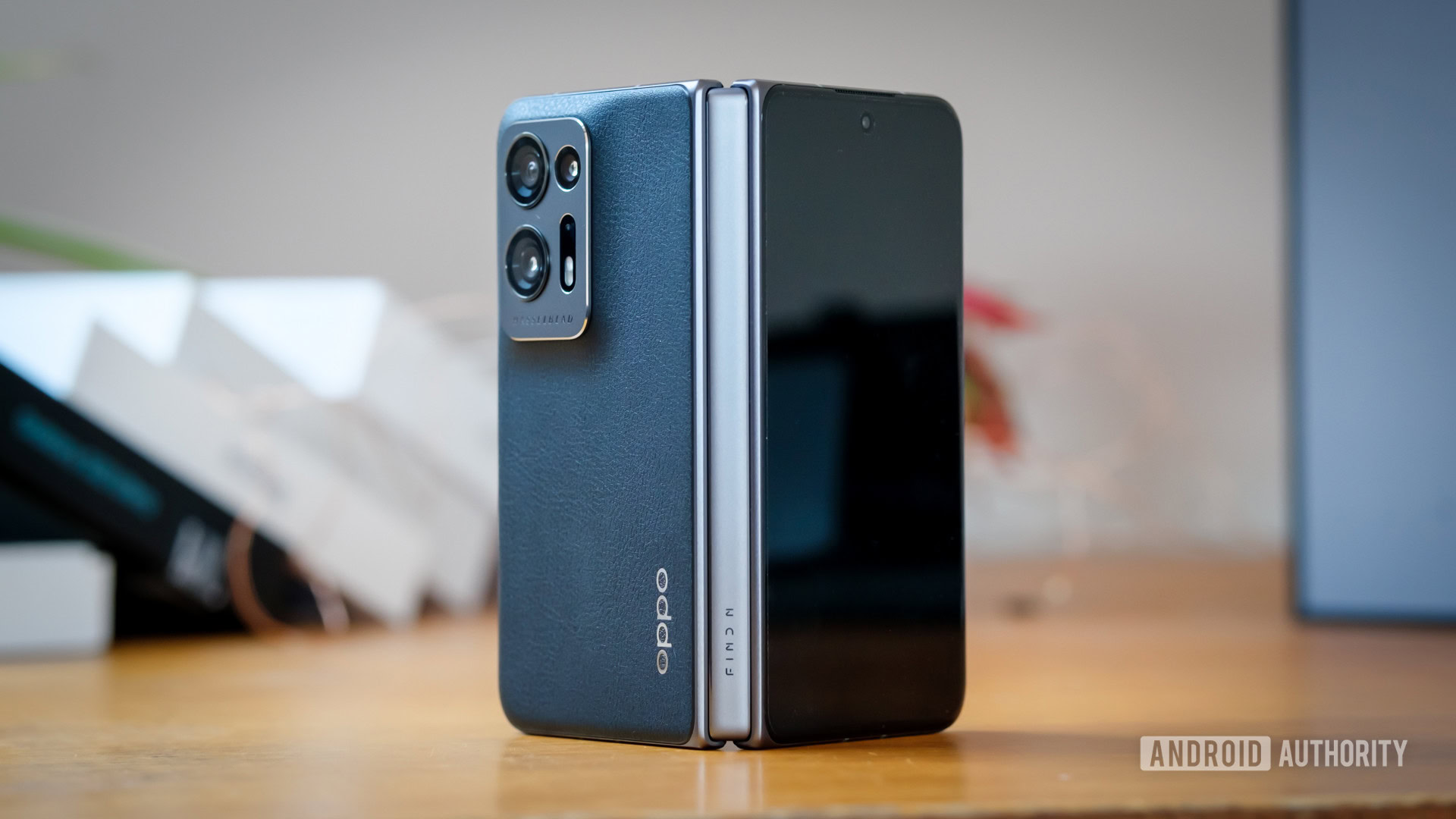
Robert Triggs / Android Authority
Oppo also claims to have vastly improved its second-generation Flexion Hinge for the Find N2. It’s smaller, hence the thinner profile, stronger, and can hold an angle between 45 and 125 degrees. I don’t have a protractor handy, but the panel really wants to snap flat once you push it beyond 90 degrees, so I’m not convinced by Oppo’s marketing there. Despite closing flush, there’s still no water resistance rating on the Find N2.
The Find N2’s form factor is perfect for one-handed use.
When we briefly went hands-on with the original Oppo Find N last year, we came away impressed by the hardware, and that’s still the case here. While there have been some changes to the key foldable components, it’s mostly a case of refinements. But that’s no bad thing. Although I still wish the inner bezels were a little thinner, despite Oppo trimming them down already this generation.
What’s changed with the Find N2?
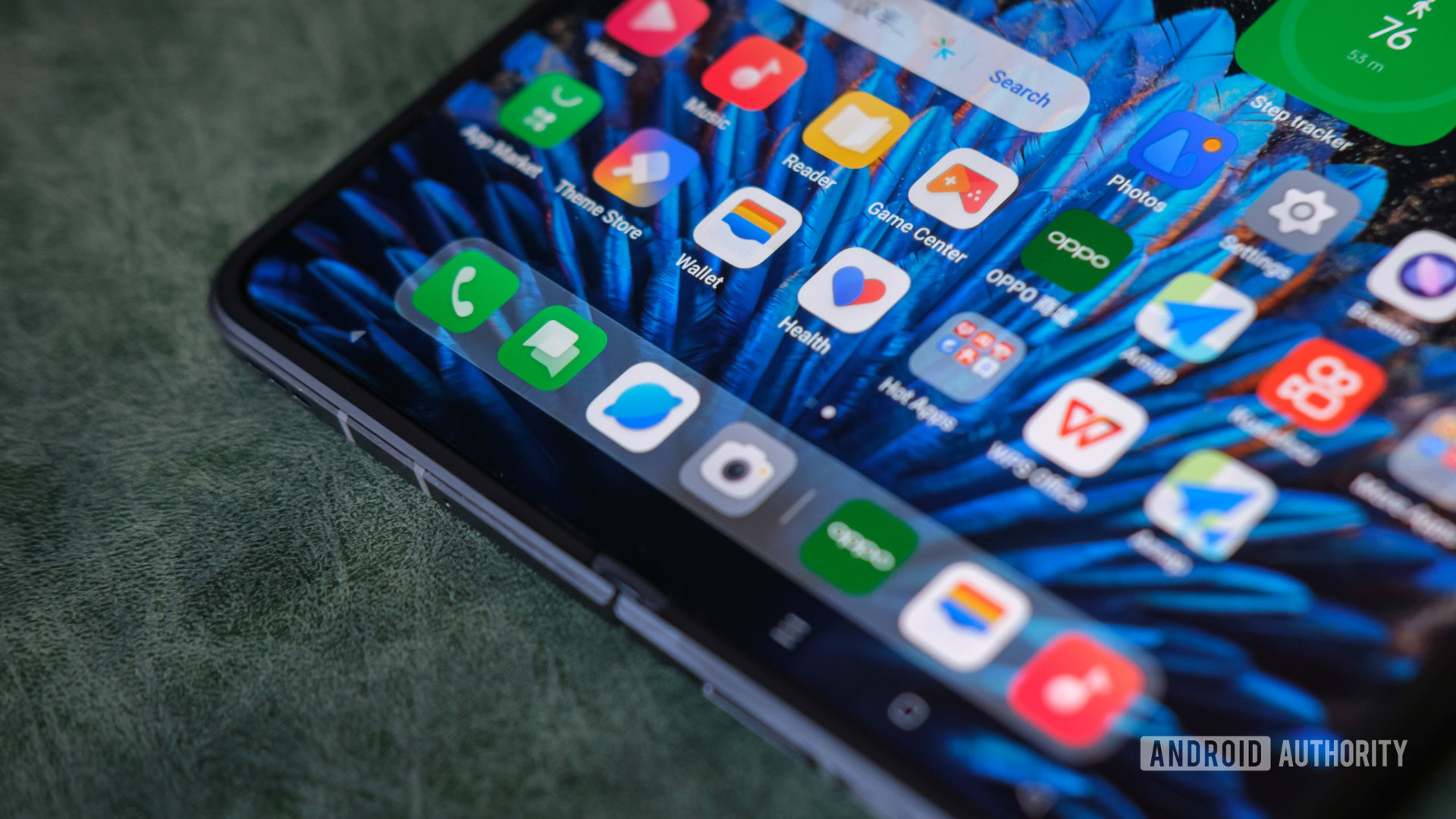
Robert Triggs / Android Authority
ColorOS 13 looks familiar but has a few changes in store. There’s now a proper-looking taskbar, complete with active and recently used apps for quick access and improved multitasking. That much is certainly an improvement over last year. However, the taskbar is limited to just four favorite apps, though you can circumvent this by using folders.
Unfortunately, the taskbar remains locked to the home screen, meaning you can’t quickly access apps when you have a window or two open. This certainly isn’t as useful as Samsung’s taskbar implementation, which remains at the bottom of the screen even when using three apps at once, allowing for instant hot swapping of applications. You’ll find yourself hopping back to the home screen much more often with the Find N2, which is a drag. You can turn Oppo’s Smart Sidebar on to fill in, but this is essentially doubling up on taskbars to address a problem that should be solved by just one.
As such, multitasking isn’t entirely seamless. Getting two apps up side by side is quite easy thanks to the swipe down the middle feature, but it takes perhaps one too many clicks to adjust this once you have two windows side-by-side. Oppo allows you to have three applications open at once using the floating window, which is probably enough. However, you can’t fit three screens side-by-side, a la Samsung.
Again though, powerhouse multitasking is hampered equally by Android’s broader lack of foldable support and the general inability of apps to talk to each other. There’s an element of drag-and-drop when using some apps, such as quickly moving text from a web page using Oppo’s browser or Chrome into Notes. However, the same doesn’t work if you switch to Firefox. Similarly, some apps don’t automatically fill the inner screen, and, obviously, only a select few work with Oppo’s “FlexForm” mode. Although this does include YouTube as well as Oppo’s camera app, which is great for getting yourself in the group photo.
Oppo’s multitasking tools have improved, but aren’t quite up to the best we’ve seen on a foldable.
The questionable nature of app support may be a reason why Oppo has yet to decide if/when it will bring the Find N2 to markets outside of China. Perhaps Chinese users are more likely to stick with Oppo’s in-house apps and/or the app markets being smaller and more controlled. During our pre-brief, Oppo mentioned its close working relationship with China’s biggest developers and that it’s attempting to extend similar support to Western markets. But the Wild West of the Google Store, let alone the larger Android app ecosystem, makes ensuring a solid UX experience a tall order outside of China.
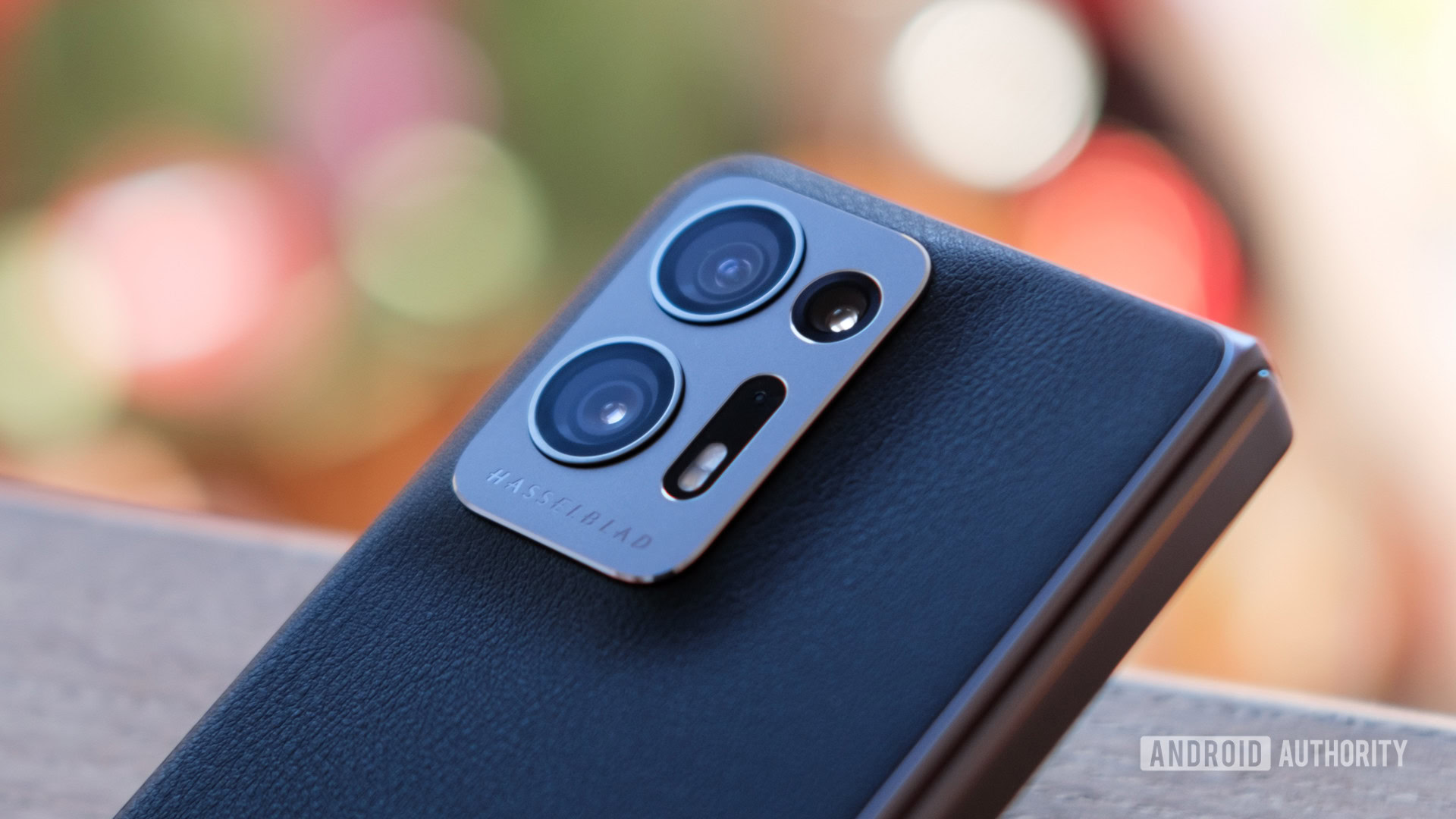
Robert Triggs / Android Authority
Another key change with the Find N2 camera array comes complete with Hasselblad branding. This partnership introduces a Hasselblad Pro mode with manual controls, RAW, and RAW Plus (10-bit) capture.
That’s not all though, the camera specs have changed too. There’s now a much larger 1/2-inch 48MP ultrawide camera (up from 1/3.1-inch 13MP) and a slightly bigger 1/2.74-inch 32MP 2x telephoto camera (up from 1/3.4-inch 13MP), complete with a wider aperture. Improved camera sensors should help the Find N2 take much better pictures than last year.
Oppo clearly wants to showcase that foldable phones don’t have to compromise on camera quality and specifications. Tell will tell whether or not it’s capable of taking on the best camera phones in the business.
Oppo Find N2: Our impressions
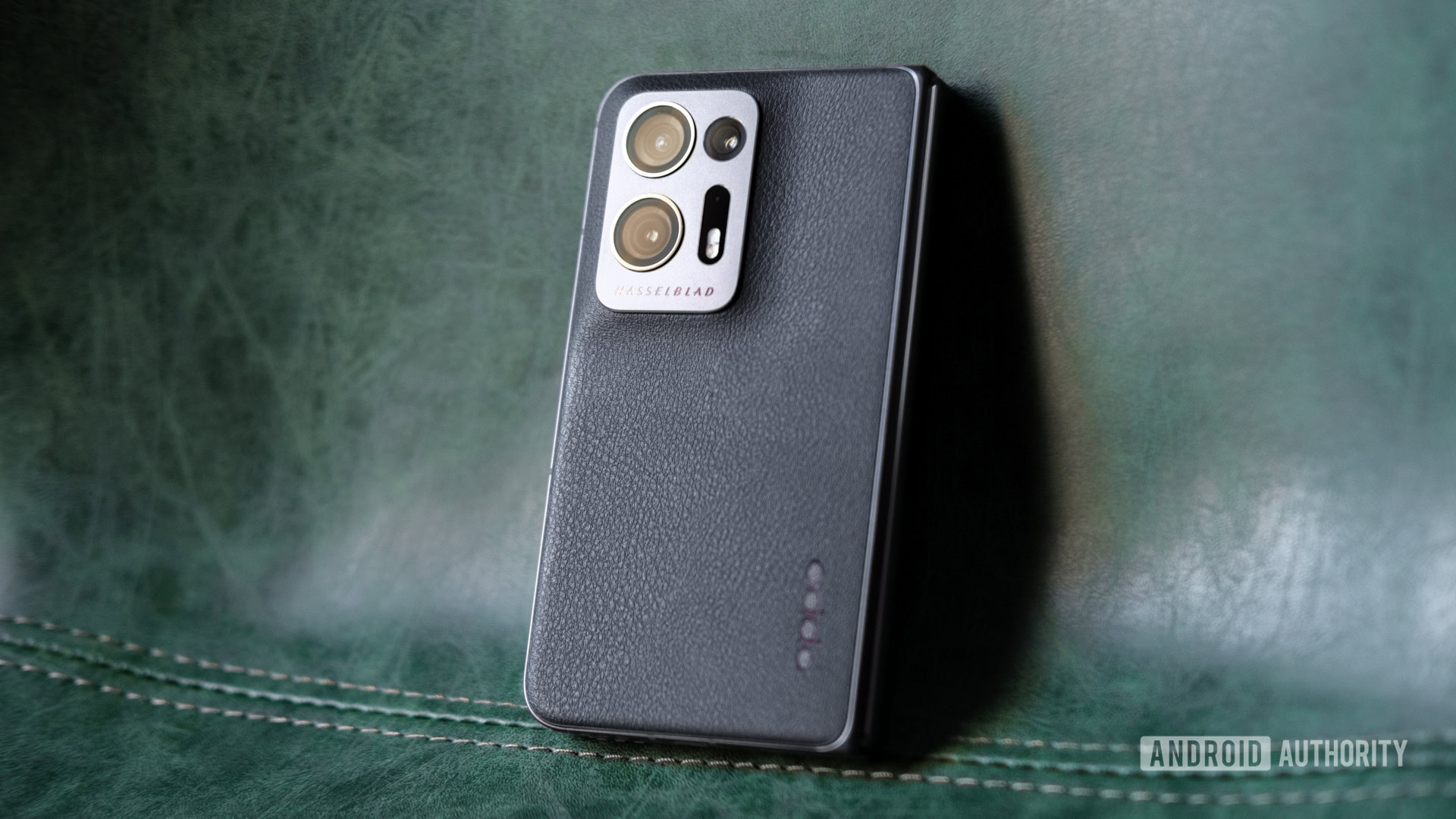
Robert Triggs / Android Authority
If there’s one key takeaway from the Find N2 it’s that Oppo knows how to make great hardware. This is a foldable very much of Oppo’s vision, and that vision scores big points in a number of key areas. The robust hinge and minimal closed gap, mostly hidden crease, design materials, and the compact form factor are all big points in the Find N2’s favor, even after spending just a short time with the device. I still don’t have an urge or need for such a large screen, but the Find N2 feels like a foldable I would like to have in my pocket.
All this leaves me wanting more from the phone’s software. Clearly, the version of the handset we tested is exclusively designed and optimized for the Chinese market and popular apps over there, so it’s tough to gauge exactly what the experience would be like with the same attention applied to Western audiences. I really want to see what this phone would be like with all those pieces in place, even if there’s still definitely room to improve the multitasking setup further.
Although the Find N2 isn’t coming West, it’s a positive sign for the Find N2 Flip.
Unfortunately, this is another foldable that doesn’t seem to be making its way to global markets any time soon. Samsung’s Galaxy Z Fold 4 continues to receive a free ride as the foldable of choice, which isn’t great when it comes to consumer choice and pushing the market for foldable up a gear. Still, the Oppo Find N2 Flip is apparently heading to Western audiences sometime next year. We’ll definitely be keeping our eyes open for that.
For all the latest Technology News Click Here
For the latest news and updates, follow us on Google News.
